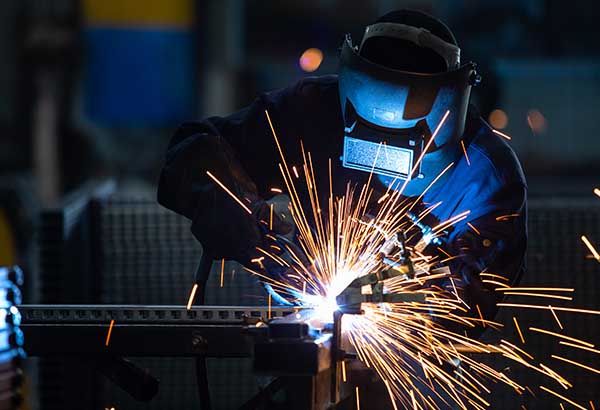
An Intensive 5-day Training Course
Introduction to
Welding & Non-Destructive Testing
Scheduled Dates
Classroom
| 02-06 Mar 2026 | Dubai - UAE | $5,950 | RESERVE A SEAT |
| 15-19 Jun 2026 | London - UK | $5,950 | RESERVE A SEAT |
| 09-13 Nov 2026 | Dubai - UAE | $5,950 | RESERVE A SEAT |
| 04-08 Jan 2027 | Dubai - UAE | $5,950 | RESERVE A SEAT |
Online
| 15-19 Jun 2026 | Online | $3,950 | RESERVE A SEAT |
| 09-13 Nov 2026 | Online | $3,950 | RESERVE A SEAT |
Would an alternative date be more suitable?
We offer a variety of tailored training options, customized to meet your organisation's needs. Delivered anytime, anywhere, we make it easy to bring expert training directly to your team.
Why Choose this Training Course?
Welding is a common and a very important joining process in most industries, and of particular importance in the chemical, oil and gas industries, including for example, pipelines and storage tanks.
This 5-day training course aim to provide the fundamental principles of welding and welding techniques, helping participants recognise various welding processes.
The training course will feature:
- Understanding the types of welding processes
- Appreciating the different types of welding joints
- Recognising technical prints and symbols related to welding
- Recognising weld defects and associated problems and learning about mechanical testing, failure of welds
- Non-Destructive Testing
- Learning about basic welding metallurgy
What are the Goals?
At the end of this training course, you will learn to:
- Types of welding process, including oxyacetylene, SMAW, TIG, MIG, and others
- Types of joints and joint design will be introduced, e.g. but, square, grooved, bevel, butt, U, J and T, flush
- Various weld defects and imperfections will be presented including, porosity, solidification cracking, hydrogen cracking, incomplete root fusion or penetration, residual stresses, reheat cracking, lamellar tearing, liquation cracking, slag inclusion and trouble shooting
- Basic metallurgy will be presented and related to welding technology, including the weldabillity of ferrous and nonferrous metals, heat treatment and the significance of the heat affected zone, HAZ
- Welding parameters, including standards, metal transfer, welding currents, shielding gas and electrode selection will be included in the courseWelding engineering drawing including standard welding symbols will be presented
- Mechanical testing and failure of welds will be presented in addition to nondestructive techniques, NDT
How will this Training Course be Presented?
The training course combines presentations and discussions of topics covered with relevant examples. It combines knowledge of fundamental principles related to welding processes, methods, and applicable standards and best industry practices and enforces learning with Question & Answer sessions to maximise the benefits to the participants.
Videos and computer simulation will be presented to emphasise relevant applications Relevant case studies will also be included. Participants will be provided with comprehensive course notes and copies of presentation material that will be very valuable for detailed study and future reference.
Daily Agenda
Day One: Introduction and Weld Joint Design
- Introduction, welding terminology, codes and standards, welding failure and case studies
- Introduction to quality, meeting requirements, customer satisfaction, quality control, how can quality be achieved?
- Weld joint design, load performance, types of joints, butt joint, square, grooved butt joint, single V, Double V butt Joint, bevel and double bevel butt, U, J and T, flush
- Welding techniques, positional welding, backing, examples, butt welds without backing
Day Two: Welding Processes
- Welding processes, process options, benefits, problems and applications, oxyacetylene process, fusion welding processes, shielded metal arc welding (SMAW), submerged arc welding, TIG welding, solid wire MIG welding, types of flux/electrodes, metal transfer mode, power source and welding current, arc starting, shielding gas, operating characteristics, applications
- Arc welding electrodes, US standard electrodes, electrode identification, electrode size and currents, common electrode types, extended electrode classification examples, BS classification of electrodes
Day Three: Welding Defects and Imperfections
- Welding defects, introduction, heat affected zone, HAZ, weld defects and imperfections, porosity, solidification cracking, hydrogen cracking, incomplete root fusion or penetration, residual stresses and cracking, reheat cracking, lamellar tearing, liquation cracking, slag inclusion
- Geometric shape imperfections - types and causes, excess weld metal, undercut, overlap (cold lapping), linear misalignment, incomplete filled groove, trouble shooting
Day Four: : Welding Technical Prints, Symbols and Basic Metallurgy
- Welding drawings (symbols), introduction, types of projection, welding joints, symbols for welds, parts of the welding symbols, placement of welding symbols, special welds, weld all around, field weld symbols and multiple reference lines
- Basic metallurgy crystalline structure of metals, crystal growth an overall bulk solidification of metals, solid solution, inter-metallic compounds, diffusion, micro-structure of carbon steel, heat treatment of steel, critical cooling rate and mass effect, heat affected zone (HAZ) in Welding, HAZ of carbon and alloy steels, HAZ of stainless steel
- Materials for welded sections, weldability of steel groups, stainless steels, cast irons, aluminium alloys, filler alloys, avoiding weld imperfections
Day Five: : Materials Testing and Non-Destructive Testing (NDT)
- Materials testing and failure, tensile testing, properties obtained from the tensile test, ductility and fracture in metals, impact testing (Izod and Charpy), transition temperature, hardness tests (Vickers and Rockwell), failure due to fracture, stress concentration, fracture toughness, fatigue failure, destructive testing of welds, bend tests, bead-on plate test, controlled thermal severity (C.T.S.) test, the test and assessment hierarch
- Nondestructive testing (NDT), definition and purpose of non-destructive testing, engineering demands for sounder materials, ensuring the integrity and reliability, maintaining uniform quality level of a product, dye penetrant, magnetic methods, X-ray methods, γ - ray methods, ultrasonic methods eddy current testing, selection of N. D. T. methods, ISO standards for NDT Inspection
Certificate
- On successful completion of this Training Course / Online Training Course, a PetroKnowledge Certificate / E-Certificate will be awarded to the delegates.
